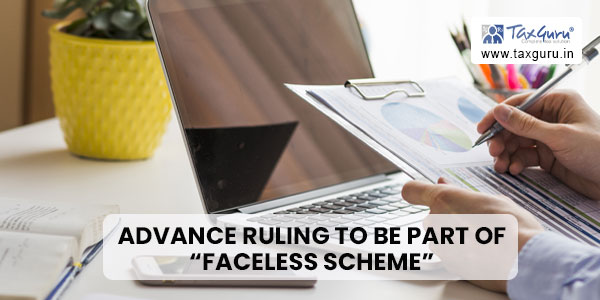Advance Ruling to be the part of “faceless scheme” vide notification No. 07/2022 dated 18.01.2022
Section 245Q of the Income Tax Act, 1961 (“IT Act”) deals with Advance Ruling. It is a mechanism which provides upfront clarity on implications of certain transactions in India vis-a-vis the provisions of Income Tax, specially to Foreign Companies, Non-residents and other stakeholders. Vide Finance Act, 2021, legislature has made provision for setting up of Board for Advance Ruling, also called BAR. The idea of replacing AAR with BAR is to quicken the disposal of cases.
With further amendment & to ensure more effectiveness, in view of Section (9) & (10) of Section 245R of the Act, Central Government or Central Board of Direct Taxes (CBDT) vide notification No. 07/2022 dated 18.01.2022, notified “e-advance rulings Scheme, 2022”, which is applicable with effect from 18-01-2022. The scheme provides for “faceless scheme” in case of Advance Ruling. The Scheme shall apply to the applications of advance rulings made to the Board for Advance Ruling [section 245Q(1) of the Act] or applications of advance rulings transferred to such Board [section 245A(4) of the Act].
This article emphasis on providing a detailed information about the “e-advance ruling scheme, 2022” in a simplified manner and the same is as follow; –
1. Application through electronic mail (e-mail): – Under this initiative, the taxpayers and other stakeholders can seek clarification on income tax issues beforehand, by filing their Advance Ruling Application via email, which can be of great help for foreign companies and non-residents. Also, the hearings of the Board for Advance Rulings shall be conducted through video conferencing/ telephony.
2. Allocation of application for advance ruling by PDGIT or DGIT; – The Principal Director General of Income-tax (Systems) or the Director-General of Income Tax (Systems) according to the case, with the approval of the Central Board of Direct Taxes, make a procedure to randomly allocate or transfer the applications for the advance ruling via an automated allocation system. After allocation of application for advance ruling, BAR would pronounce e-advance ruling after considering the merits of the case. The BAR would consist of such other income tax authority, ministerial staff, executive or consultant, to support the members of BAR, as considered necessary by CBDT.
3. Procedure for submission, handling and disposal of application: – CBDT, in paragraph 6 of Notification, also prescribed the procedures for submission, handling and disposal of the applications for advance rulings by BAR u/s 245Q (1) or u/s 245Q (4) (transferred cases) of the Income Tax Act, 1961. CBDT categorically deals with following; – “Procedure for filing applications for advance rulings”; “Procedure on receipt of applications” and “Order for advance rulings”.
4. Submission of additional facts: – Under the scheme, the BAR, may at its discretion, ask applicant to submit such additional facts as may be necessary for proper adjudication. Also, the applicant may, after the application has been allowed, suo motu, submit any further material, information or evidence, as may be relevant to such proceedings, to the Board for Advance Rulings.
5. Verification of information; – Where in the course of any proceedings before the BAR, any fact not contained in the application for advance ruling, are sought to be relied upon by the applicant, the same can be submitted before BAR, subject to verification in such manner as may be provided in such application. The Scheme further provide that BAR shall have all the powers of Civil Court as provided under the Code of Civil Procedure, 1908.
6. No requirement of personal appearance: – The applicant shall not be required to appear either personally or through an authorized representative before the Board for Advance Rulings or before the Secretary, ministerial staff, executive or consultant posted with the Board for Advance Rulings.

7. Proceeding not open to Public: – The proceedings before the Board for Advance Rulings shall not be open to the public. No person other than the applicant, his employee, the concerned officers of the Board for Advance Rulings, the Income-tax authority, or the authorized representatives shall remain present during such proceedings, even on video conferencing or video telephony.
8. Authentication of electronic records: – All the electronic records shall be authenticated by BAR, the Principal Commissioner of Income Tax; or the Commissioner of Income Tax, as the case may be, by affixing their digital signature. Further, applicant or his authorized representative can affix his digital signature at the time of filing its income tax return.
9. Appeal lies to High Court: – An appeal against an order for advance ruling passed by the BAR under this Scheme shall lie before the High Court.
10. Rectification of mistake apparent from record: – With a view to rectify any mistake apparent from record, BAR may amend any order passed by it. Such amendment may be made suo-motu or when the mistake is brought to its notice by the applicant or the Principal Commissioner of Income-tax or Commissioner of Income-tax, as the case may be, but only after allowing the applicant and the Principal Commissioner of Income-tax or Commissioner of Income-tax, as the case may be, a reasonable opportunity of being heard.
11. Appointment of “Secretary”:– The scheme provides for appointment of “Secretary” who shall be responsible for custody of the e-records of BAR and shall exercise such other functions as are assigned to him under this Scheme or by the BAR by separate order
12. Power to specify format, mode, procedure and processes:- The Principal Chief Commissioner of Income-tax (International Taxation) shall, wherever required, in consultation with Principal Director General of Income Tax (Systems) or Director General of Income Tax (Systems), as the case may be, with the approval of Board, lay down the standards, procedures and processes for effective functioning of the conduct of e-advance rulings proceedings under this Scheme, including format, mode, procedure and processes in respect of the following, namely:__
(i) service of the notice, order or any other communication;
(ii) receipt of any information or documents from the person in response to the notice, order or any other communication;
(iii) issue of acknowledgment of the response furnished by the person;
(iv) provision of “e-advance rulings” facility including login account facility, tracking status of e advance rulings proceedings, display of relevant details, and facility of download;
(v) accessing, verification and authentication of information and response including documents submitted during the e-advance rulings proceedings;
(vi) receipt, storage and retrieval of information or documents in a centralized manner; and
(vii) general administration and grievance redressal mechanism in the respective Boards for advance ruling.
Conclusion
Considering the e-advance ruling scheme of 2022, it can be said that new scheme is helpful considering the fact that majority of applicant applying for advance rulings are non-resident and are situated outside India. With the advent of e-advance ruling, non-resident applicants can easily participate in the proceedings through electronic mode without the need to travel physically. However, the scheme will be successful only after its implementation in reality. Further, authorities must ensure that proper opportunity must be provided to applicant, while conducting hearing through video conferencing.






Nice.. So is the ARA now functional?
No, the ARA or AAR is now replaced by BAR. Now, the application of advance ruling can only be filed before BAR for adjudication.
No, AAR or ARA is not functional and is replaced by BAR. Also, all the pending application will be transferred to the BAR along with all records and relevant documents